 I had the extraordinary honor of meeting Hanon and Judith and other members of the Living Theatre in NYC in 2004, when we marched and performed together as part of the troupe's Code Orange Cantata in the massive protest against Bush's re-nomination.
I had the extraordinary honor of meeting Hanon and Judith and other members of the Living Theatre in NYC in 2004, when we marched and performed together as part of the troupe's Code Orange Cantata in the massive protest against Bush's re-nomination. Hanon died this past weekend following a bout with pneumonia after a massive stroke in April.
When Hanon joined Judith to formally continue the Living Theatre after Julian Beck's death in 1985, he helped formulate the following statement of the collective's continuing mission.
Hanon explains that and just a little bit more, here excerpted from an interview by Will Swofford (available at http://www.bigbridge.org/fictwswofford.htm):
Hanon Reznikov: When Julian died in 85, I was called upon to redefine the mission of the Theatre as we decided to continue and what we, what I, wrote down then said:
To call into question
who we are to each other
in the social environment of the theater,
to undo the knots that lead to misery,
to spread ourselves across the public's table
like platters at a banquet,
to set ourselves in motion
like a vortex that pulls the spectator into action,
to fire the body's secret engines,
to pass through the prism
and come out a rainbow,
to insist that what happens in the jails matters,
to cry "Not in my name!"
at the hour of execution,
to move from the theater to the street
and from the street to the theater.
This is what The Living Theatre does today.
It is what it has always done.
I saw Paradise Now when I was 18 in 1968 and I was very turned on by it, I found it very sexy. I discovered extraordinary means of communication that were non-verbal and non-linear, evidently happening between the actors in the performance. This indicated to me very much the sense of there being other possibilities than the limited, rational, logistic possibilities we were being told were the only way to go. So my trip with the Theatre really began with my contact with them in that year, in '68, when they were doing Paradise Now. I didn't actually start working with them until a few years later. But my sense of the event of Paradise Now was one of extraordinary freedom, and it seemed like the world was just beginning to figure out how free it could be.
 Diane di Prima
Diane di PrimaRevolutionary Letters.
San Francisco: Last Gasp, 2007.
160 pages, available for $15 from the Barn
Diane di Prima, America’s (and probably the world’s) leading anarcho-Hermetic poet, has issued a new edition (the fifth) of her famous Revolutionary Letters, containing all of the poems from the City Lights versions from 1971 through 1980, plus 23 new and more recent pieces. This new edition emanates—rather oddly but not inappropriately—from Last Gasp, a publisher mostly known for underground comics.
Although I’m nostalgic as can be about Flower Power and the Sixties Revolution That Failed, I have to admit that not very much great literature arose from the Events of and around 1968. After all, it was a mass uprising, not an elitist Art Movement. The best stuff was largely supplied by our Elders the Beats. In this respect, Revolutionary Letters is a major literary work of that era.
We learn from the first poem that Diane’s unique blend of anarchism and Hermeticism was adopted or adapted from her beloved grandfather, an Italian worker who admired both Giordano Bruno (the great Renaissance magician and martyr to Free Thought) and Carlo Tresca, Sacco and Vanzetti, and Dante. Up to about Letter #30, the poems breathe an April air of pure hippy utopianism and unbounded optimism, which was the mood du jour for all of us.
When you seize Columbia (University), when you
seize Paris, take
the media, tell the people . . .
Not if but when. Then comes Letter #30, “To Those Who Sold the Revolution Summer of ‘68” and the beginning of a tougher and less fizzy attitude—not “revolutionary pessimism” because Diane is no quitter—but a darker mood. In Letter 32, she realizes
not western civilization, but civilization itself
is the disease which is eating us.
Now the hot revolutionary rhetoric of the earliest poems is tempered more and more by the complexities of Hermetic thought, but only to grow even angrier and more intransigent—a call for
a flying leap
to another ‘plane’ or ‘sphere’
& I don’t know into what, don’t ask, only
I know it won’t be worse.
(#71)
Making the link between, say, Emma Goldman and Paracelsus, is itself an alchemical operation, and a question already posed by Surrealism, although Revolutionary Letters shows little direct influence from the latter. Olson and Duncan and Pound are the models. But the earliest poems were shouted in the street at Digger demos, and the book is dedicated to Dylan (and her grandfather); it is a profoundly American book, turning high erudition into native song, evoking the iconic American Indian, the IWW, the Summer of Love.
Back when there were mimeograph machines, Diane wrote that the best thing to do with one would be to drop it off a five story building on a cop’s head. Some of these poems still have that kind of impact: almost a poem as bomb. But more than that (or parallel to it), they also chronicle the political heart of a great poet whose alchemical recipes for revolution attain the timelessness of a Whitman or Ginsberg: the political as personal. Letter #89, “Independence Day 2002” (and thus one of the most recent) reads in its entirety thus:
bald eagle
making a come-back
so am I
published in Fifth Estate 376, Halloween 2007

This past July marked the 40th anniversary of the Detroit riot/rebellion/uprising/insurrection.
The Fifth Estate, then a biweekly newspaper, covered the riots days after they occurred. Peter Werbe, still a writer and editor with FE, wrote the following story.
FE discussed the riots on their twentieth anniversary in 1987, when T. Fulano wrote the reflection that follows Werbe's article here.
While I was a mere tadpole swimming in my mama's womb during the summer of 1967, my experience of Detroit was always shaped by the riot's resonance. (I lived in Southfield, Michigan from 1982-86 and in Detroit proper from late 1987 through the end of 1994.) I discuss the anniversary of the summer of riots and love here.
“get the big stuff”
FE 35, August 1-15, 1967
Peter Werbe
“The chickens are coming home to roost.”—Malcolm X, Nov. 22, 1963
Malcolm was right, of course, and the chickens have come home so many ways since that grim day four years ago.
The destruction, looting, killing, and violence have been chronicled to such an extent that no repetition is necessary here.
This newspaper has concentrated its observations on the hippie, new left, and avant garde community it serves.
The geographical center of that community—the
The Fifth Estate office at Warren and John Lodge was unharmed as were the adjacent offices of the Artists’ Workshop, Trans-Love Energies, and the Detroit Committee to End the War in
Hippie and political residents of the
They joined the Negros and Southern whites in cleaning out the stores on
Kae Halonen, a resident of W. Hancock, described the scene as that of integrated looting. “There was complete cooperation between the races in their common endeavor,” she said. “There were children carrying toys they never would have been able to afford.”
Detroit’s Communications Company, which distributes leaflets in the area put out a broadside that advertised “Detroit Summer Plunder Festival” and advised residents to “Get the Big Stuff” and “Loot—it’s the American Way.” One hippie was reported to have unlocked an abandoned gas station and was pumping free gasoline to anyone who came along.
When asked if looting was not contrary to the hippie philosophy of love, John Sinclair, head of Trans-Love and Fifth Estate staffer replied, “We told the merchants before the riot they should give everything away, but they wouldn’t listen.”
“It’s a little out of hand, but it’s beautiful,” said one hippie. “It looks like
Residents of Prentis, near WSU, report severe abuse at the hands of the
Eric Glatz of 669 Prentis told of how police and national guardsmen entered his apartment and struck him several times. An eye witness report of other brutality appears elsewhere in this issue. The Fifth Estate welcomes other first-hand reports of the riot including illegal experiences. Anonymity of the writer is of course assured.
As I sat typing this story two carloads of
“Stand up and touch your toes!” yelled one cop at those stranded in front of the building.
The cops searched their victims and in the process kicked one to the ground. There was no problem in the neighborhood, but that’s how it always is on Prentis.
H. Rapp Brown, chairman of the Student Nonviolent Coordinating Committee, who was arrested July 26 for inciting to riot, said “We (Negroes) built this country and we’re going to burn it down.”
And it looks like they will if
That’s a hell of a chicken.
“July 1967”
T. Fulano
FE 326, Summer 1987
It was a full scale beggar’s banquet, the return of the repressed, a surprise party. The city people, young and old, black and white, went through the pawnshop windows like meteorites. Nervous exorcists, trembling before a mortal turned evil and massive and enigmatic, the politicians asked, “Who are you?” And like demons unleashed from an inferno, they answered, “Many.”
How it burned! Ferocious and magnificient, in the conjured-up, premature, arsonist dawn. It was a small moment of truth: the plundered became the plunderers. Booze ran in the streets from the shattered liquor stores. Then the blood ran. The cops and the troops began their grim retaking of the city. Fifty caliber wasps swarmed against the apartment buildings, cutting through the brick effortlessly. Tanya Blanding, four years old, was dragged away in the bullets’ undertow, a touch of
Today
The tragedy is that so few looters ever learned the meaning of their festival and started buying into the new program on time. The tragedy is that so many have turned fatalistic and have turned their backs on their potential allies and their faces to the wall. The tragedy is that there is now a surplus of snipers, and they’ve got no aim.
It was a binge, a saturnalia, a world turned momentarily upside down. It was a tremor, coming from deep recesses that some would prefer to wish away, to buy away, to machine-gun away. But it’s still there, a shifting tectonic magma, rumbling, creaking, pressure building, and it won’t go away.

Robert Anton Wilson: Author The Illuminatus! Trilogy & Cosmic Trigger, Dies at 74
by Peter Lamborn Wilson
For all we knew, Robert Anton Wilson and I were related. On an intuitive basis—i.e., after several rounds of Jameson’s and Guinness—we decided we were cousins. Subsequently we came to believe ourselves connected to the Wilsons who play so murky a role in the “Montauk Mysteries” (Aleister Crowley, UFOs and Nazis in
There’s no doubt Bob was some sort of anarchist. His earliest interests and experiences (the
When Bob was on the road a lot in the 80s and 90s doing “stand-up philosophy” in cities across the US, he visited New York often and after his lectures he drank with anarchists, libertarians and ceremonial magicians—his fan base, as it were—although he used to say he could never join the Libertarian Party because he couldn’t bring himself to hate poor people enough. He called Libertarians, “Republicans who smoke dope.”
Bob was a Futurist and I am a Luddite, but after a long series of letters back and forth we agreed to disagree on the subject of technology, since neither of us wanted to put ideology in the place of camaraderie.
We got too much enjoyment out of our shared interests: the Propaganda Due, Freemasonic Conspiracy, science fiction, “Irish Facts,” as Bob called his favorite Celtic paradoxes and tall tales, occult and lost history, pirates, strange science and Fortean phenomena, the Discordian Church (co-founded with anarcho-taoist Kerry Thornley of the “Universal Rent Strike,” r.i.p.) in which he appointed me Pope—because all Discordians are Popes. (But Bob was The Pope—also his title in the Church of the SubGenius.) Bob was one of the great pub talkers, probably a lot like Brendan Behan or Dylan Thomas (he somewhat resembled both of them physically).
Liquor and weed for him were bardic fuel.
I’m proud to say I appear—under several guises, alter egos and noms de plume—in one of Bob’s last books, Everything Is Under Control (1998), a sort of encyclopedia of his favorite conspiracies. Unlike some of his admirers, Bob never believed in any one conspiracy as more (or less) real than another. He simply took a chaote’s delight in humanity’s occasional talent for genuine mystery; and for him, Imagination was a form of reality. Was he playing or was he serious? Exactly.
In later years, when he cut down on his grueling dada vaudeville speaking tours and retired to
Founding a political party may not seem a doctrinaire anarchist sort of thing to do, but Bob was first and deepest a post-Nietzchean homo ludens, playful man, perpetrator of the lusus seriosus, the “serious joke.” In his best writing, the Illuminatis! books (starting in 1975, co-created with the late Bob Shea) for example, R.A.W. approached his idol James Joyce in sheer ludic intensity, and his other idol Flann O’Brien in number of laughs per page.
Certainly his works belong to the literature of anarchy, like say Alfred Jarry’s or Oscar Wilde’s, if not to the literature of anarchism.
Despite a good deal of suffering in life (his childhood polio and the long sickness of his wife Arlen; the murder of his daughter; and his dying broke), Bob always appeared cheerful, which is either very good advertising for Neuro-Linguistic Programming (a theory he developed with Tim Leary, but which I never quite understood), or else for the therapeutic virtues of cannabis. For instance, some years back a rumor was spread maliciously on the Internet that Bob was dead. Instead of getting annoyed, he had great fun doing the Reports-of--my-death-have-been-greatly-exaggerated routine.
I see in R.A.W.’s Wikipedia obituary (sent to me by carrier pigeon from Fifth Estate’s southern HDQ)—an otherwise lackluster text—that Bob was equally amused the second and final time as well, telling his correspondents, “Please pardon my levity, I don’t see how to take death seriously. It seems absurd.”
He died five days later.
Tombeau for R.A.W.
Poem & pomology -- false etymology
or proto-Indo-European ha-ha?
The small-k kabbalist relishes
a poemogranate from the garden
in
denounced by Lysenko, dies in Gulag)
discovers
not far from the genetic epicenter of hemp.
throws out the first ball of the season
over the fence into the Hesperides
or Tir na Nog the island of
Irish Facts. Turn down gents
your jiggers of Jameson’s.
—P.L.W
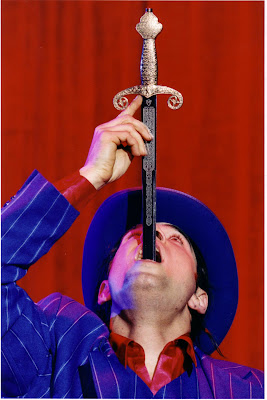
"Mr. Pennygaff's Solid Steel Sword Swallowing," promotional photo courtesty of the Bindlestiff Family Cirkus
Bindlestiff Family Cirkus: The First Ten Years, DVD, $20
available from Fifth Estate Books at PO Box 6, Liberty, TN 37095
or visit http://bindlestiff.org
This review by Anu was originally published in the Fifth Estate, Winter 2007 issue.
“A little duct-tape, a little cardboard, and it’s a show.”
–Stephanie Monseu aka Philomena Bindlestiff, co-founder of the Bindlestiff Family Cirkus
Around the same time I learned that revolution shouldn’t sell selfless sacrifice if it wanted to gain any self-interested revolutionaries, I also discovered dangerous devotees of dissent inside the proliferating avant-garde arts. A fire-breathing follow-up to the performance scene, a traveling anarchist circus was an obvious offshoot from the standard stock of shock that shot us with performance artist Karen Finley and crushed us with the neotribal music of Crash Wosrhip. Founded by Kinko and Philomena Bindlestiff (aka Keith Nelson and Stepahnie Monseu), these veterans of visionary weirdness admit, “Circus is hard.” The first decade of Keith and Stephanie’s death-defying adventures are captured in a new DVD documentary.
While ostensibly offering something new, something original, the Bindlestiff Family Cirkus brought us something simultaneously old-fashioned. Vaudeville and sideshow predate punk and performance art and fancifully create authenticity and artifice, juggling fire on the freak continuum. Of the many amazing aspects of this ensemble’s enduring eccentricity, I’m always drawn to the idea that such strangeness is delightfully old-fashioned. It’s also experimental and daring.
When the Bindlestiff Cirkus began, the old-school sideshow scene had yet to become surprisingly trendy in the taverns and theaters of the underground. Even though a radical, traveling circus is no longer a novelty, it’ still needed. Keith explains, “Bindlestiff grew out of the late-night, New York underground performance scene of the early 90's. New York at that point was a different place. We lived in a dirtier, smuttier city steaming with life. Now, our environment is a bunch of Starbucks, Trader Joes, Home Depots, and McD's.”
Inspired by books like Hakim Bey’s Temporary Autonomous Zone and a willingness to do anything—from traveling with a bookmobile to swallowing swords and eating worms—the Family Cirkus has, since its inception, incorporated political commentary into its schtick.
Keith elucidates, “My clown, Kinko, is of the tramp tradition. In his silence he is able to express the pain of life. Before I cut the dollar bill in my sword swallowing act, I lament on the fact that the US spends 40 million dollars on the inauguration of a shit-head we didn't elect.”
Keith’s partner in performance and the life of the crime of not selling out is Stephanie Monseu. Working with as many as sixteen performers at a time and hundreds of performers over the years in a variety of variety shows, Keith and Stephanie comprise the circus core—their website calls ‘em the “Ma and Pa of the Bindlestiff Family.”
Somehow, the Bindlestiff idea has resisted both gentrification and recuperation. That is, they’ve refused to be bought, and they’ve maintained ideals of parody and protest in the process. Keith summarizes, “The Cirkus goes beyond Demanding the Impossible, we achieve it.”
Sometimes, achieving the impossible is a high-wire act that involves balancing ideals and imminent needs. Keith reflects on the daily economic challenge of channeling his characters: “As we have grown, more and more time is spent having to deal with the world as a business. The more we wanted to reach out to the public and perform for the noble people, the more we had to join the grid. We have faced law suits, death threats, cancellations, 9/11, a crashed economy, but the show must go on.”
To say that the Cirkus has been successful without selling their sideshow souls to the dueling devils of mediocre feats and money fetishism would only scratch the surface. When many anarchist circuses would last no longer than a summer stint soaked in the stench of PBR and hobo sweat, the Bindlestiff Family actually attempted to make the circus arts sustainable, having to balance radicalism with respect. Keith explores this tension:
“In the beginning, we had to explain what a Cirkus is to a rock club. As more DIY circuses arose, we had to deal with troupes who did not treat venues with respect. After the many shows arose, we had to explain that we were tighter, more professional, and above all, more respectful of venues than the other shows.”
Because Keith admits “I don't really know how to do anything else,” with Stephanie, he plans on continuing Kinko’s kinky career well into midlife. Welcoming the shamelessly shocking shows filled with lusty laughter, the troupe’s past and future audiences will certainly appreciate this commitment to the circus life.


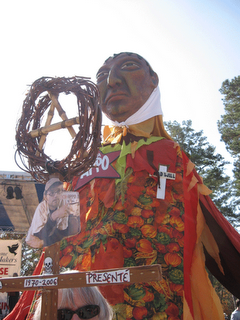
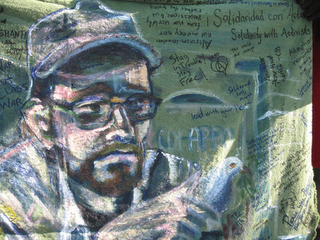
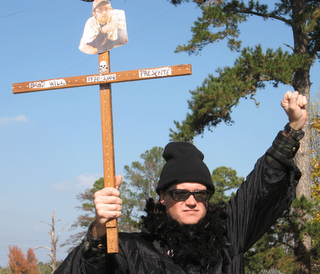
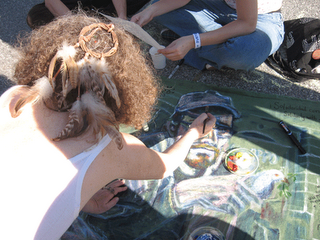
Each year, as part of the massive peace rally at the gates of Fort Benning, protesters stage a funeral procession to honor the dead, the victims of violent repression in Central and South America.
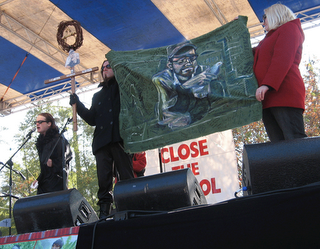
With this year's event coming so soon after Brad Will's tragic death, I felt compelled to bring his memory with me to the doors of death.
These are some photos from our "Brad Bloc," including our special Circle-A Cross, a banner painted in the streets on Saturday and carried on Sunday, Jen Angel and David Solnit's Oaxaca/APPO puppet, Sunfrog reading "Brad Willing" from the mainstage on Sunday . . .
Brad willing
Nov 12, 2006 05:24PM EST
For Bradley Roland Will (1970-2006)
Brad willing, we’d stop talking about Brad and act more to support the struggle in the streets from New York to Mexico and beyond
Brad willing, we’d never stop talking about Brad because to talk about Brad is to breathe life into all that he embodied—joy and laughter and camaraderie and utopian beauty infused in all our struggles—and he’d never be one to buy the duality that separated our words and actions anyway
Brad willing, we won’t make him a martyr because he dreamed a world where we don’t need martyrs
Brad willing, he will always be remembered as an amazing anarchist martyr because if he doesn’t embody the definition of a martyr, a radical love warrior and witness who died in pursuit of a profound transformation ofthe pathetic status quo into a greater human integrity, then who does
Brad willing, we won’t think of his death as any different, no more or no less, than every death, every loss, every tragedy, every war-torn sorrow in a world that kills its lovers with the bullets of poverty and racism and greed while its murderers make money with impunity and shameless pride
Brad willing, we won’t ever deny that his spark sparked others, that his dedication and enthusiasm were unique and rare and inspirational, taking note and detail from the dramas of the world and inciting riots of music and lust and food and land and justice
Brad willing, we won’t endlessly debate the meaning of his death on blogs and bulletin boards because there’s much greater work to be done
Brad willing, we will debate as much as we need to, because the conversation and the process and the agreements and the disagreements and the messy consensus are the compost for the radical community that is our garden of the future
Brad willing, he’ll start a squat in heaven and demand that the leaders of the celestial bureaucracy come off their fluffy clouds and join the eternal struggle for heaven on earth, which of course will be a polyamorous pot haze of a permanent autonomous zone
Yeah, I dreamed I saw Brad Will last night alive as he could be
We know it takes more than bullets to kill our comrade
Especially one this free
Brad willing, we will never forget him
Brad willing, we will win
(he always knew me as) Sunfrog,
remembering Brad at the bolo bonobo of Pumpkin Hollow Community
12 November 2006